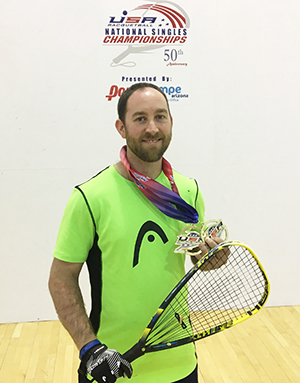|
|

Profiles in String: Brent Walters
Conversations With Players/stringers Who Have Made Successful Careers In Racquetball

Raleigh, North Carolina's Brent Walters, 38, has won: 20 state titles, including singles, doubles and mixed doubles; 15 national titles, 8 in doubles, 7 in singles; and the North Carolina Athlete of the Year 6 times. He is a much sought after stringer as well.
|
By Steve Crandall
Vice President, Sales & Marketing
Ashaway Racket Strings
If it were not for a thunderstorm one summer afternoon when he was 13, Raleigh North Carolina's Brent Walters says he never would have played racquetball. As is, Brent, 38, has won: 20 state titles, including singles, doubles and mixed doubles; 15 national titles, 8 in doubles, 7 in singles; and the North Carolina Athlete of the Year 6 times. He is a much sought after stringer as well.
So powerful and dominant is he on the court that he's called, "the Walrus." He is sponsored by Ashaway and Head, and this past spring he won the 2019 National Doubles 35+ in Tempe, AZ, as well as the National Singles for 30+ and 35+ in Highlands Ranch, CO. He did the same in the 2017 singles as well.
We recently had a chance to chat with him about his game and his career:
Ashaway: Tell us a bit more about how you got involved in the game.
Brent: Well, after that thunderstorm, I pretty much played 8-10 hours a day through the summers from '94 throughout my high school years. I excelled pretty quick at the game and made it to the quarter finals in the first junior nationals I went to.
Ashaway: You turned pro after college but then tore your ACL, correct?
Brent: Yes, I got ranked as high as #17 on the IRT in '03, but finished the season at 21 after hurting my knee. But if I hadn't gotten injured I think I could have been a top ten pro. As far as my game style goes, it's real hard-hitting on both forehand and backhand. My serve and my forehand are a kind of one-two punch that dictates my game. I can also change and play a slower game, but I prefer to drive serve and hit 140-150 mph on the serve.
Ashaway: And you've been playing with Ashaway string how long?
Brent: Twenty-three years. I'm using MultiKill® 17 now, strung at 32 lbs. I like its feel and durability. The way I hit, I used to tear through SuperKill® 17. But this new MultiKill 17 really lasts. I get 20-30 hrs. of court time with it. I have to cut out the strings, usually. I play one tournament a month, on average, so usually I'll string up two fresh racquets and, if I've played three to four matches, I'll cut the string out and restring it for the finals. But the MultiKill has a nice feel. It's got explosive power and the ball comes off the racquet pretty quick.
Ashaway: Tell us how you got involved in stringing:
Brent: I got my first machine in '96 and became the unofficial stringer for the club. I strung a bunch of racquets to help pay the bills in college and I was the official stringer for the IRT Tour when I was playing. I helped out Rex Lawler in the stringing booth at the Nationals and was part of his team for the US Open, and still work with Ian Titus now and then. For the last three years, I've been the Official Stringer for the National Singles and Doubles. I'm also the Pro Shop Manager at the North Hills Club and Omega Sports in Raleigh, where I string 2,000+ racquets a year. I string for many local racquetball tournaments in the Southeast as well.
Ashaway: Any trends you've noticed over the past few years?
Brent: I would say in the '90s people were stringing their racquets in the high 20s and low 30s, and now the tension has gone up into the 30 to 35 range. In tennis, there is a lot of polyester and hybrid stringing and much lower tensions than before. People used to string a tennis racquet at 60 to 65 lbs. and now it's 50 to 55 and sometimes even down into the 40s.
Ashaway: Do you find your customers very knowledgeable about string?
Brent: Not really. Most people don't know what's a good string or a bad string. They might just be looking at the bottom line, what they are paying. You get a lot of people, too, who experience a little bit of string breakage and think it's outrageous.
Ashaway: Do you advise your clients on string choice?
Brent: I try to tell people strings are like your car tires. Your strings are the only things touching the ball, so you want to have the best thing for the road. Spend the most you can afford. But it's the kind of thing, if it's not broke, don't fix it. If someone likes a string, they're kind of set with it, and they're kind of superstitious about changing strings. But when a new string comes out, some people always want to try it.
Ashaway: What are your future playing goals?
Brent: I won the North Carolina State Singles Championship Open Division for a record 6th time this past spring. My future goals are to win the Open Singles at 40 years of age and triumph over Steve Dayvault, who won at 39 years old. I would like to hit 30 National Titles as well.
Ashaway: Well, we wish you all the luck!
|